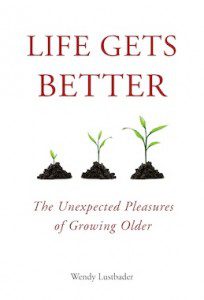 In order to confront the pervasive stereotypes about youth and what it means to get older, professor and author Wendy Lustbader draws on her decades as a social worker with elders and their families to present a message contrary to the one blasted over every media outlet: life gets better with age! In her book, “Life Gets Better: the Unexpected Pleasures of Growing Older,” Lustbader defies all conventional logic and discusses the process of getting older as an adventure in personal discovery and increasing vivaciousness. Here is an interview about her new book.
In order to confront the pervasive stereotypes about youth and what it means to get older, professor and author Wendy Lustbader draws on her decades as a social worker with elders and their families to present a message contrary to the one blasted over every media outlet: life gets better with age! In her book, “Life Gets Better: the Unexpected Pleasures of Growing Older,” Lustbader defies all conventional logic and discusses the process of getting older as an adventure in personal discovery and increasing vivaciousness. Here is an interview about her new book.
1. What are some of the specific ways in which life gets better as we get older?
Wendy: First, our self knowledge becomes more extensive, and from this we become more adept at asserting our opinions and preferences. Then we start bungling our relationships less often because we gain a further understanding of our own and others’ motives, needs, and feelings. The benefits of clear communication also become increasingly apparent.
Gradually, we come to make better decisions, using the hard-earned benefits of hindsight. We look back at our earlier mistakes and misadventures, weighing our choices on the basis of experience rather than conjecture. We gain a much greater grasp of the mixture of luck and diligence required to live a good life. We know so much more about what contentment looks like and how to seize it when we can. Often, a wonderful kind of freedom and courage emerge from this consciousness.
2. Why is youth a period of anxiety and self-doubt for so many?
Wendy: The societal message that in youth we should be having “the time of our lives” actually instills anxiety in us when we run into necessary periods of self-examination and have to grope to find our way. It can seem that everyone else has their act together, but what’s really going on is that we keep our doubts and insecurities concealed from one another.
In busting open these myths about youth, my book explores how natural it is to suffer during the years when we incessantly compare ourselves to others and have not yet accumulated sufficient self-confidence. It is much easier it is to live once we get through hard times and prove to ourselves that we possess durable strengths.
3. What are some of the ways that our relationships with our loved ones change over time?

Wendy: With our intimate partners, we can take responsibility for the parts of ourselves that are hardest to deal with – because we finally know ourselves well enough to do so.
With grown children, we can look back at both our mistakes and what we did well in our parenting, having conversations with a greater degree of honesty than was possible before. In getting older themselves, our adult children may begin to comprehend the burdens and strengths we carried from our own parents.
Old friends become more and more precious to us as the years pass. They can look at us for who we once were and who we are now, appreciating the difficulties we have overcome, the abilities we have acquired, and the ways we have stayed true to ourselves.
Our understanding of siblings grows over time, and this can lead to reconciliation where there once was conflict and something like friendship where before there was alienation. Those who have always been close find their bond becomes even more significant.
4. Do the emotional benefits of growing older transcend the physical limitations that come along with it?
Wendy: This transcendence is absolutely central to life getting better. In many ways, the physical dimension of life becomes less important as the soul enlarges. In my late twenties, I was astonished by the elders with whom I began to spend most of my professional time – how vivacious so many of them were, once I looked beyond my negative bias.
To this day, the media hold up shining examples that run counter to the expected dwindling — the athlete who runs marathons in his nineties or the spry woman who climbs a mountain on her 70th birthday – but these exceptions only promote the rule of diminished expectations and the mistake of measuring life according to physical standards.
The real action is interior — all the growth that cannot be seen externally and to which we tend to have little access until we have experienced it ourselves.
5. One of the biggest concerns many people have about getting older is worries about changes in their physical appearance- yet for many people, getting older actually helps them with body acceptance. Why is this?
Wendy: There is a paradox here. Those who remain over-focused on their physical appearance, especially in the desire to appear as if they are still young, only end up making themselves miserable. In contrast, by accepting our aging and letting its lessons broaden us internally, we become calmer in the face of the body’s inevitable deterioration. Becoming less attached to our outer appearance is so liberating.
6. What advice would you give to someone who is apprehensive about growing older?
Wendy: Be patient with yourself and take heart. Your self-confidence will grow if you seek challenges and worry less about the initial insecurity. You will find your way. Don’t be afraid of getting stuck in some of the necessary compromises. Learn everything you can from each experience, even if something seems irrelevant to your true purpose. The older we get, the less prone we are to putting off what we really want to do, therefore you will be able to seek out new directions later. Stay open and curious, and realize that the best is yet to come.

